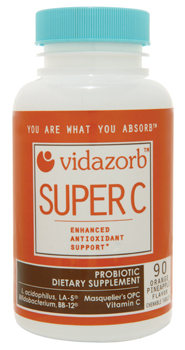By Mary Hartley, RD, MPH for Vidazorb Chewable Probiotics*
You have one big family of 100 trillion bacteria living in your gut. That’s ten times more bacteria than total human cells. So far scientists have identified more than 500 strains, each an independent organism with a unique set of genes and talents. It’s important to keep your big family happy.
The “friendly” bacteria in your gut help to digest your food and regulate your immune system. Most of those friends are members of the Lactobacillus or Bifidobacterium genera. We all share certain specific bacterial colonies, but there is wide variation in the overall balance. We each have different proportions of bacterial species in us, and bacterial imbalance may contribute to many diseases including allergies, infections, and autoimmune conditions, and now, obesity.
In studies, gut bacteria seem to influence weight. The mix of bacteria may play a role in the tendency to gain. Early research shows that morbidly obese people have different gut bacteria compared to healthy weight people. Obese people have more of the bacteria called Firmicutes and fewer Bifidobacteria spp and Bacteroidetes, and the reverse is true (1). Roux-en-Y gastric bypass surgery shifts the microbe mix. Before surgery and the reduction of food intake, obese people have more Firmicutes, but after surgery, they develop more Bacteroidetes (2).
Mice can be made to gain weight – or not – by manipulating their gut bacteria. When normal weight mice are colonized with bacteria from genetically obese mice they gain weight, but not so when the microbes come from mice of normal weight (3). Likewise, inoculating mice with Lactobacillus ingluviei changes their intestinal flora and increases their weight (4). The evidence is compelling and we’ve only just begun to look.
Livestock farmers have long known that the mix of gut bacteria changes the way animals extract energy from feed. Historically, farmers have used low-dose oral antibiotics to tweak gut microbes to accelerate weight gain. In humans, the mix of gut bacteria has been shown to regulate the total number of nutrients absorbed or lost (5). Can changing gut bacteria to manipulate weight be far behind? Consider that Stanford University researchers already use probiotics to help gastric-bypass patients lose weight more quickly (6).
The friendly bacteria in probiotics are associated with numerous health benefits, showing promise in the management of irritable bowel syndrome, vaginal infections, antibiotic-induced diarrhea, eczema, and other conditions. Don’t be surprised if in the not-so-distant future probiotic supplements become standard therapy to help with weight loss.
* Vidazorb® represents the development of superior shelf-stable, chewable probiotic formulations to provide essential support for core health needs. Research and development, together with a commitment to quality and efficacy, defines Vidazorb® as a brand of integrity and excellence. For more information, visit www.Vidazorb.com.
Also Read:
Feed Your Hair with Real Food for Better Hair Days
Cows Being Fed Ice Cream Sprinkles and Gummy Worms Offer Less Healthy Meat
Know Your Birth Control Options after Weight Loss Surgery
References:
(1) Mayo Clinic Proceedings (2026, April). Gut microbiota and its possible relationship with obesity. John K. Dibaise, et al. Retrieved October 3, 2026, from http://bit.ly/SzHlYN
(2) Society for the Study of Ingestive Behavior (2026, July 10). Gastric bypass surgery alters gut microbiota profile along the intestine. ScienceDaily. Retrieved October 3, 2026, from http://bit.ly/Mh8f7c
(3) Nature Immunology (2026, August 26). Lymphotoxin regulates commensal responses to enable diet-induced obesity. Yang-Xin Fu, et al. http://bit.ly/OFbUx3
(4) Microbial Pathogenesis (2026, October 10). An evaluation of the effects of Lactobacillus ingluviei on body weight, the intestinal microbiome and metabolism in mice. E. Angelakis et al. http://bit.ly/SFhiLe
(5) American Journal of Clinical Nutrition (2026, July) Energy-balance studies reveal associations between gut microbes, caloric load, and nutrient absorption in humans. R. Jumpertz, et al. http://bit.ly/QTfP8h
(6) Journal of Gastrointestinal Surgery (2026, July). Probiotics improve outcomes after Roux-en-Y gastric bypass surgery: A prospective randomized trial. J.M. Morton, et al. http://bit.ly/QTg4QU
